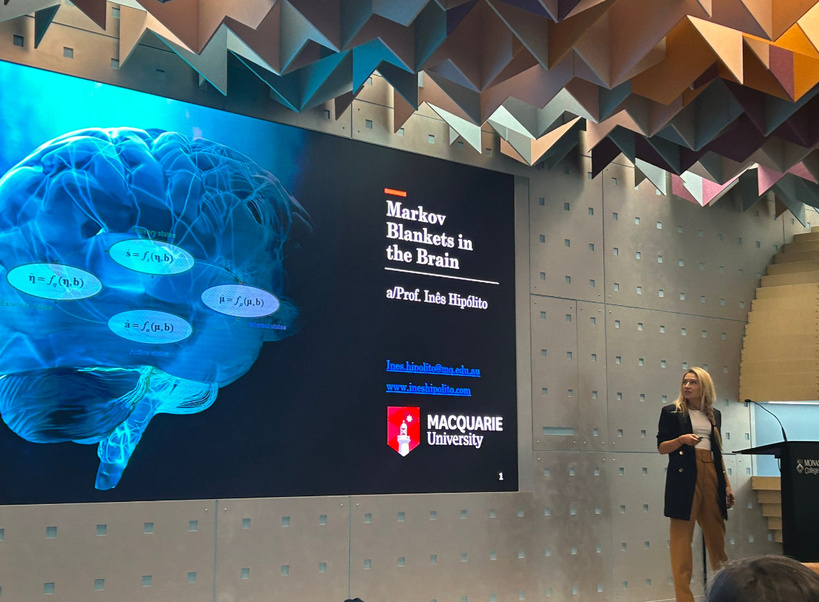
INES HIPOLITO
COGNITIVE SCIENCE OF ARTIFICIAL INTELLIGENCE
Welcome to my digital space! I am Dr. Inês Hipólito, an Assistant Professor at Macquarie University, specialising in philosophy of mind and cognitive science. Prior to this role, I served as a lecturer at the esteemed Berlin School of Mind and Brain, located at Humboldt-Universität Berlin. I employ E-Cognitive Science, Complex Systems, and the Free Energy Principle to investigate the dynamic relationship between human cognition and artificial intelligence.
My interdisciplinary background in Philosophy, Cognitive Science, and Computational Neuroscience places me at the crossroads of several fields. This position allows me to facilitate meaningful dialogues and collaborations between disciplines like neuroscience, psychology, philosophy, and computer science.
I am driven by interdisciplinary collaboration. I’ve co-founded (with Gualtiero Piccinini) the International Society of the Philosophy of the Sciences of the Mind. I serve as co-Pi at the "Designing Urban Density: Neurourbanism as a Novel Approach in Global Health". In the past (2017-2023), I also had the privilege of serving as an elected member of the Diversity Committee and Women in Philosophy Committee at the Australasian Philosophy Association.
I am also passionate about bridging the academic-industry divide to maximise the societal impact of our research. I serve as an AI ethics advisor/architect for Verses, a cognitive computing company. I have also founded and lead MissionAI specialising in advising organisations in fostering mission-driven and ethical AI culture.
My work has been featured on New Medical Life Sciences, News Medical, Frontier Scientists, ABC, AEON. Explore my publications, speaking engagements, and research. I look forward to sharing insights and engaging in meaningful collaborations, especially to learn from diverse knowledge standpoints.
RESEARCH

Photo by Leanne Rath @Monash University “Math and the Brain Workshopn 2023”
Approaching cognition as inherently situated, I explore a wide spectrum, spanning from fundamental neurobiological processes to agent-level cognitive practices and activities. My specific focus centers on understanding cognitive development within a cultural environment.
Through the application of complex systems theory and active inference modelling tools, my contributions aim to shed light on the intricate interplay between human cognitive practices and the continually evolving landscape of AI environments This encompasses the impact of AI-immersed environments on human cultural practices, cognitive development, mental health, and overall wellbeing.
.

EDITED SPECIAL ISSUES
(open) Humans and Large Language Models. Journal of Cultural Cognitive Science (with Bidisha Som; Fernando Marmolejo-Ramos)
(Open) Active Inference and Well-being, Neuroscience of Consciousness (with Kiverstein & Miller)
(2023) Bayesian Brain. Consciousness and Cognition (with Michael Kirchhoff)
(2023) Bio AI: From Embodied Robotics to Enactive Cognition Frontiers in NeuroRobobitics (with Adam Safron, Andy Clark)
(2023) Realism in Computational Neuroscience. Synthese (with Matteo Colombo, Thomas van Es, Guilherme S.Oliveira)
SCIENTIFIIC TALKS ONLINE
PODCASTS
- The Complexity Wanderer, The Comptemplative Science Podcast
- Neuroscience and Embodiment: A Dialogue with Inês Hipólito, Converging Dialogues
- Enactive Cognition, Culture, Artificial Intelligence, and Diversity in Science, The Dissenter
- AI, Gender and Robots with Inês Hipólito at The CAVE, Macquarie Research Centre in Ethics and Agency
- Markov Blankets, Modularity, Enactivism, The Active Inference Institute
INTERVIEWS
Work with Me

ines.hipolito[at]mq.edu.au
Michael Kirby Building, 17 Wally's Walk, Office 250
Macquarie University
Sydney, NSW 2109, Australia

invest, network, and build INFRASTRUCTURES that PRIORITISE diverse epistemic perspectives for progress and innovation.
Build spaces of joy, love and hope Center solidarities Center indigenous, migrant, gender diverse values


